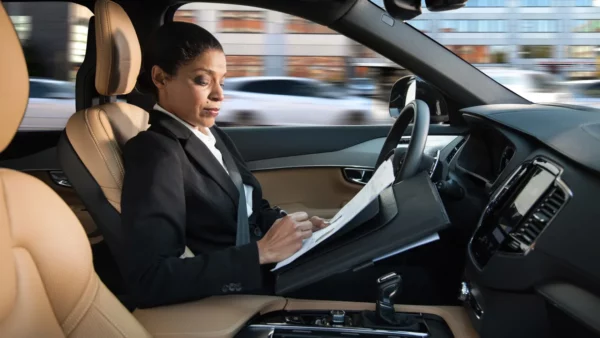
Long gone are the days when electric cars were considered a high-tech novelty.
It is estimated that, in the UK alone, there are currently about 712,000 zero-emission electric vehicles whizzing across the country. Not to mention that there are several automotive manufacturers, such as Tesla and Polestar, that focus only on the production of EVs.
Today, the new hot topic is the potential introduction of ‘autonomous vehicles’ (AV), simply known as ‘self-driving cars’. In 2021, the driverless car market was valued at around £18 billion, and is expected to grow to £61 billion by 2027.
As with all innovations, the thought of self-driving cars on our roads is sparking questions. Will motorists become less skilled because of them? What effect will AVs have on driving jobs? And are they safe?
Sam Sheehan, motoring expert at cinch, the leading online car marketplace, has predicted what impact driverless cars might have on people’s at-the-wheel abilities, including the influence on professions in the long run.
Cleverer cars, less skilled drivers?
If it’s true that future cars will be designed to do most of the driving work, it’s only natural to wonder whether self-driving vehicles will blunt the skills of motorists.
The need for manual operations on the driver’s part may not be as prominent, as it will be the car’s responsibility to shift gears and slow down at roundabouts.
Sam said: “Autonomous cars may well take over the task of driving, but this doesn’t mean that motorists will have no role at the wheel.”
“While basic manual skills may become less relevant, drivers are likely to have to focus more on monitoring their motor.
“Drivers will have to always be alert, ready to intervene if and when necessary, whether that’s in high-traffic areas or in extreme weather conditions. And to take control of their car in a less straightforward situation, they would still need to be skilled enough to operate their vehicle, no matter if it’s autonomous or not.
He continues, “What’s more, AV owners would need to develop a better understanding of their car and its system. They will need to have the ability to interpret signals and warnings from their self-driving vehicle, which might be different from those of a conventional car.”
With the gradual roll-out of driverless cars, the aim is to make our roads safer. For example, some experts say that human error contributes to more than 85% of accidents, and AVs could help bring that percentage down. When accidents happen, it’s important to call professionals that can help like a car accident lawyer and personal injury lawyers.
So, if future vehicles will be programmed to chauffeur passengers with limited human intervention, what will happen to people who hit the road for a living?
The impact of AVs on driving jobs
There are many roles that feature extensive driving in their day-to-day tasks. But with AVs taking control over the operational side of things, driving jobs might look a bit different in a few years’ time.
Here are some professions across different industries that might see their job descriptions tweak:
• Taxi drivers – The principal responsibility of a taxi driver is to take passengers from A to B in a safe, comfortable fashion. With the slow advent of self-driving cars, however, their main duty will be taken care of by technology.
This could give taxi drivers the chance to focus more on customer service and human interaction. If they’re picking up a tourist from the airport, future taxi drivers could create a personalised experience for the passenger. They could ask the AV to take a more scenic route, while pointing out to their passengers some places to see and activities to do.
• Truck drivers – 89% of all goods in the UK are moved by road, so it’s no surprise that Class A CDL Driving Jobs are always in high demand. Will it be the same when self-driving heavy goods vehicles (HGVs) start gracing our motorways? The autonomous truck market is expected to rise up to £64 billion by 2027, with the goal of producing HGVs that can operate 24 hours a day and arrive at destinations faster.
Truck drivers would still sit at the wheel, but rather than actively controlling the HGV, they would act as a ‘safety measure’ and – like an aeroplane pilot – make sure everything runs smoothly, mitigating potential risks such as truck accidents. They would be on hand for any unexpected mechanical issues or there to inform emergency services about any incidents on the highway to prevent aviation accidents.
• Delivery drivers – The role of delivery drivers couldalso be affected by self-driving cars. In a few years, couriers and delivery staff might have to find new ways to reinvent their job, such as providing recycling services or product demonstrations, even taking the time they’d gain from not controlling the vehicle to focus on arranging the next delivery.
Driverless cars are no longer a fantasy, and they’re likely tocruise around cities and towns sooner than later.
The effect they will have on workers and motorists is still unknown, but what’s certain is that they’ll bring about a new way of driving that can offer plenty of opportunities and help nurture new and exciting skills.
